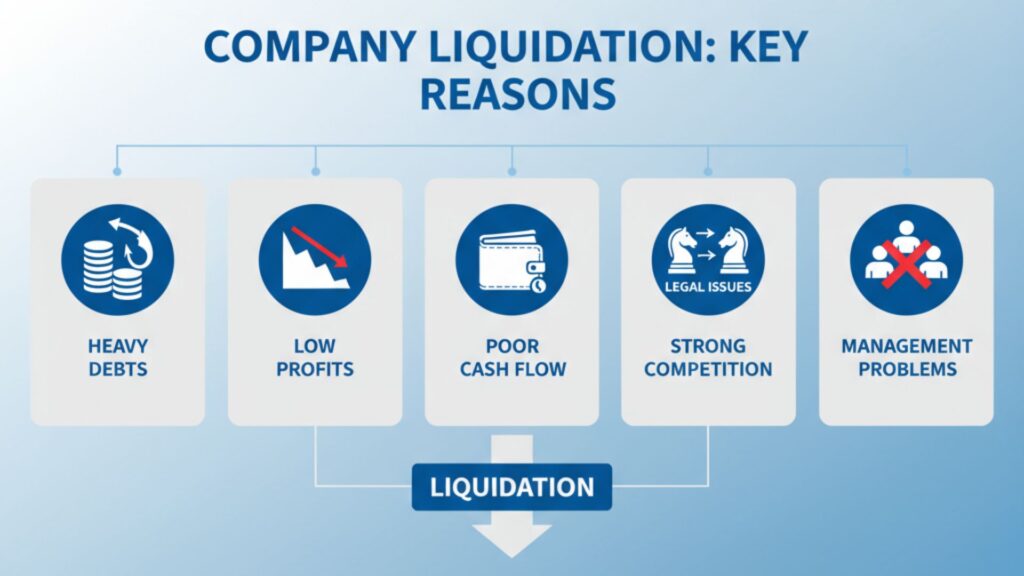Reasons for liquidation of company are often linked to financial pressure, rising debts, or falling profits. Some businesses also face cash flow problems that make it hard to cover daily expenses. When these challenges build up, keeping the company alive becomes difficult and owners start thinking about what step to take next.
Liquidation offers a legal and structured way to close the business. It ensures debts are cleared, creditors are paid, and owners are protected from further losses. By understanding the main reasons for liquidation of a company, business owners can make informed decisions and recognize that sometimes closure is the most practical path forward.
What Does Company Liquidation Mean?
Company liquidation means closing a business in a legal and organized way. When a company is liquidated, its assets are sold, and the money is used to pay back creditors, suppliers, and others who are owed money. After this process, the company is officially closed and removed from the business register.
Liquidation can happen in two main ways:
Voluntary Liquidation in Simple Words
This happens when the company owners decide to close the business on their own. They may choose this option if the company is no longer making profit, if debts are too high, or if they simply want to stop operations in a legal way.
Compulsory Liquidation in Simple Words
This happens when the court forces a company to close. It usually occurs when the company cannot pay its debts, and creditors request the court to take action. In this case, a liquidator is appointed to sell the company’s assets and pay back what is owed.

Common Reasons for Liquidation of Company
Every company faces ups and downs, but sometimes the problems grow too big to fix. When this happens, liquidation becomes the only way forward. Here are the most Common Reasons for Liquidation of Company:
Heavy Debts and Mounting Loans
When a company borrows money but cannot pay it back, the pressure from banks and creditors grows. If debts keep increasing with no clear way to repay, liquidation is often the final step.
Low or No Profits
A business cannot survive for long without profit. If sales keep dropping and the company is spending more than it earns, closing down may become the only option.
Poor Cash Flow Management
Even if sales look good, a business may still fail if there isn’t enough cash to cover daily costs like salaries, rent, or bills. This cash shortage often leads to liquidation.
Legal or Regulatory Problems
If a company breaks the law, faces lawsuits, or fails to meet business regulations, it can be forced into liquidation by the court.
Market Changes and Strong Competition
Sometimes the market changes so much that a company cannot keep up. New technology, cheaper alternatives, or stronger competitors can push a business out of the market.
Management Issues and Internal Conflicts
Poor planning, bad decisions, or disputes between business partners can weaken a company. In some cases, fraud or misuse of funds also leads to liquidation.
End of Business Purpose
Some companies are started for a specific project or goal. Once that goal is complete, the owners may decide to close the company through liquidation.
What Happens When a Company Goes Into Liquidation?
When a company goes into liquidation, the process follows clear steps. Each step is meant to make sure that debts are paid as much as possible and that the business is closed in a legal way.
Step 1: Appointment of a Liquidator
A liquidator is appointed to take control of the company. The liquidator’s job is to manage the process, deal with creditors, and handle the company’s property.
Step 2: Selling Company Assets
The liquidator sells the company’s assets, which may include:
- Office equipment and furniture
- Company vehicles
- Stock or inventory
- Machinery or tools
- Business property or real estate
The money collected from these sales is then used to pay back the people the company owes money to.
Step 3: Paying Creditors and Settling Debts
After assets are sold, the liquidator pays the creditors in a set order. First, secured creditors are paid, then employees and suppliers, and finally others if money is still left.
Step 4: Closing the Business Officially
Once all payments are made and the company has nothing left, the liquidator closes the company. The business is then removed from the official register and no longer exists.

Why Business Owners Should Understand These Reasons
Knowing the reasons for liquidation of a company is important for every business owner. It not only helps in making better decisions but also protects the business from bigger problems in the future.
Avoiding Bigger Financial Losses
By spotting the warning signs early, owners can take action before debts grow too large. This can save money and prevent the company from reaching a point where liquidation is the only choice.
Preventing Legal Trouble
If a company continues trading while unable to pay its debts, owners may face legal action. Understanding the reasons for liquidation helps business owners act in time and avoid court problems.
Making Better Business Decisions
Knowing why companies fail gives owners the chance to plan better. It helps them manage cash flow, improve profits, and create strategies that keep the business strong.
Is Liquidation the Only Option?
Liquidation is not always the only path for a struggling company. In many cases, business owners have other choices that may give the business a chance to recover or reduce losses.
Business Restructuring
Business restructuring means making changes that improve how the company works. This may include:
- Cutting down extra expenses that are not needed
- Working with suppliers to get better prices
- Focusing on products or services that bring more profit
- Bringing in new investors to add fresh funds
- Changing leaders or management style to improve decisions
Restructuring can give a company new life and help it survive in a competitive market without closing down.
Selling or Merging the Company
Sometimes, closing is not the only answer. Owners may choose to:
- Sell the company – This allows another business or individual to take over. The money from the sale can be used to clear debts and give owners a clean exit.
- Merge with another company – By joining with a stronger or more stable business, the company can continue to operate while reducing costs and sharing resources.
Both selling and merging give a chance for the company’s brand, employees, and customers to remain supported, instead of shutting down completely.
When Liquidation Becomes the Best Solution
If debts are too high and recovery is not realistic, liquidation may still be the most responsible step. It gives owners a legal way to close, pay what is owed, and move forward without greater risks.
Frequently Asked Questions
The main reason for liquidation is when a company can no longer pay its debts or continue its operations. Owners may also choose liquidation if the business is no longer profitable or has completed its purpose.
Liquidation can be caused by:
- Heavy debts that cannot be repaid
- Falling profits and poor cash flow
- Legal or regulatory problems
- Market competition or industry decline
Disputes within management
The nature of liquidation is to close a company in a legal way and use its assets to pay back creditors. The causes can include financial losses, unpaid debts, or legal orders from the court.
The three main types are:
- Voluntary liquidation – Owners choose to close the company.
- Compulsory liquidation – The court forces the company to close.
Creditors’ voluntary liquidation – When creditors agree with owners to close the business and recover what they can.
In some cases, yes. A company may restructure, find new investors, or merge with another business to avoid liquidation. But if debts are too high and recovery is not possible, liquidation may be the only option.
The liquidator uses the money from selling company assets to pay creditors. If some debts remain unpaid after the process, they are usually written off unless owners have given personal guarantees.
Conclusion
Not every company is meant to last forever. Some face debt, low profits, or market changes that make it hard to continue. In such cases, liquidation becomes a practical way to close down in an organized and legal manner.
By understanding the main reasons for liquidation of a company, business owners can prepare early, avoid bigger problems, and make smarter choices for the future. If your company is facing this stage, Capital Closure can guide you through the process and make liquidation simple, clear, and stress-free.



